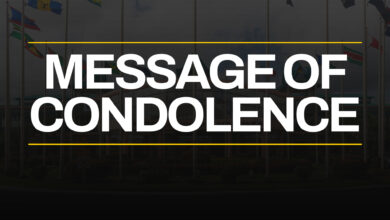Mr President
It is an honour to participate in this debate on cooperation between the UN and the Caribbean Community (CARICOM) in this Millennium year. Member States of this august organisation have already marked the year with some major activities, the primary one being the Millennium Summit last September. In this year also, in March the United Nations and its Specialised Agencies met with the CARICOM Secretariat and Associate Institutions of the Caribbean Community in The Commonwealth of the Bahamas. At that Forum we focused on issues of concern to the wider Caribbean and we assessed the status of our cooperation as well as exchanged ideas on other areas for possible cooperation, in full recognition that the viability of our Caribbean region is integrally linked to global and hemispheric developments, for the Caribbean is an integral part of global and hemispheric developments.
The evolving global and hemispheric events have brought new challenges and new opportunities to the dynamic process of human, social and economic development in the Region. In charting its way forward, the Caribbean Community has placed people at the centre of its agenda. The Community has also resolved to strengthen its institutions so that they are well equipped to function effectively in the increasingly competitive global economy. Good governance and democracy will remain the hallmarks of our political, social and economic development. These are some of the elements of the vision of our Region as our Community seeks to participate fully in the hemisphere and in the wider international community.
We invite the international community to share this vision with us, a vision that places priority on the human potential, on our people – all our people. This is in keeping with the focus of the Millennium Summit on the world’s people. The Secretary-General’s Report entitled “We the peoples: the role of the United Nations in the Twenty-First Century”, inextricably linked the United Nations to the welfare of the world’s people. We consider this an essential creed binding on all members of this world community.
For some time, the nations of the Caribbean have been calling for greater focus on the Agenda for Development that embraces growth with equity. We are pleased to note that the United Nations systems have waged a successful campaign that has broadened the comparative basis of measuring development, have introduced into the consciousness of a global community the notion of international public goods, and insisted on more concerted efforts to reduce poverty and to mainstream issues related to gender. At the same time, we recognise the importance of conflict resolution and peace-keeping in times of hostility. We emphasise however that the prevention of hostilities, are, in the long term, the most effective means of peacekeeping.
Poverty is the worst form of violence against humankind. Poverty and underdevelopment are fertile fields for hostilities in families, within countries and among neighbouring countries. Development which removes or reduces poverty and deprivation is the most effective weapon in peace-keeping. Poverty can only be eliminated by empowering the poor through access to life skills, and by social and economic investments. Aid and debt relief, although necessary and critical measures, will not by themselves uplift the lives of the many poor in the world.
In this context, we strongly support the initiative of the United Nations to convene early in 2001, a High-level Event on Financing for Development. We urge the International Community, and particularly the more developed and prosperous Members, to treat this initiative with the seriousness it deserves. Let it not be just an event, an opportunity for regrets and added frustration. Let it be a meeting where the excellent ideas, the wise words as expressed during the Millennium Summit, are translated into concrete and meaningful activities to address the real issues of the world.
In our discussions with the United Nations and its Specialised Institutions earlier this year, the Caribbean representatives highlighted the efforts to deepen cooperation in our Community, particularly the establishment of a CARICOM Single Market and Economy and the positioning of CARICOM in the global economic environment to participate more effectively in international and hemispheric economic negotiations and policy making, including the WTO negotiations in agriculture and services, the International Telecommunications negotiations, follow-up to UNCTAD X, and the thrust to focus on the Social and Environmental Factors in Sustainable Development. We call for the strong support of the United Nations and its Specialised Agencies to these objectives and initiatives. We also look to the UN and its Specialised Agencies and the wider international community to support the Region’s efforts as its seeks to overcome the challenge of the digital divide.
We look to the UN and its specialised agencies; and we do so in full recognition of what our collaboration can achieve. Most recently, with the collaborative assistance of PAHO/WHO and UNAIDS we have developed a comprehensive Plan of Action for HIV/AIDS in the Caribbean which is garnering financial and technical support from a cross section of international agencies. UNFPA has pledged to work with us in the conduct of the 2000 Round of Population and Housing Censuses in the Caribbean. The UN-ECLAC/CDCC, based in Trinidad and Tobago and established to serve the Caribbean provides valuable support in the area of economic and social activities in the Caribbean Region. Its work needs to be acknowledged and further supported.
Mr President, the small states in the Caribbean are very vulnerable to international developments and natural phenomena. This was clearly demonstrated in the Report of the Commonwealth Secretariat/World Bank Task Force, “Small States: Meeting Challenges in the Global Economy” completed earlier this year. Hurricane Keith provided one of our annual reminders last month. As Deputy Secretary-General of the Community and a national of Belize, I take this opportunity to thank the countries and agencies which have contributed to the relief effort in Belize in the aftermath of Hurricane Keith. The Commonwealth Secretariat/World Bank Report demonstrates that these are not infrequent random events but a constant threat to small states, demanding systematic and sustained effort of the international community to reduce the vulnerability of these states. We urge the international community including the multilateral agencies to adopt and implement the conclusions and recommendations of the Report. Let us recall that many of the actions necessary were signaled to us in the Barbados Plan of Action for Small Islands Developing States.
Mr President, in this vein of the reduction of vulnerability, the Caribbean Community wishes to thank the international community for the Resolution “Promoting an integrated management approach to the Caribbean Sea area in the context of sustainable development” adopted at the Fifty-fourth Session of the United Nations in December 1999. While the Resolution did not embody the full concept of the Caribbean Sea as a Special Area in the Context of Sustainable Development, it moves significantly in the direction of securing this patrimony and lifeline for future generations of Caribbean people. We in the Caribbean are organising ourselves to implement the Resolution. We are acutely aware however that success requires international cooperation.
We trust that this session of the UNGA, in considering the UN Secretary-General’s report on the Resolution, will not only encourage the further development of the integrated management approach to the Caribbean Sea area which, in the Caribbean context, must take the nexus between the activities on the land and the sea into account, but in so doing, will also positively consider the wider concept of recognising the Caribbean Sea as a Special Area in the context of Sustainable Development. For let us face it, Mr President, the Caribbean Sea is the most important natural resource shared by all states in the Caribbean region and for many economic and social purposes. If properly defended, managed and recognised by the international community as an integral part of the Region’s developmental efforts, it will be preserved for the continued use and ongoing activities of future generations of people of the Caribbean and the world.
Mr President, the Caribbean Community, as a Community of Small States, needs a strong United Nations and responsive international system. The democratic norms which are generally shared and encouraged within countries must also be the hallmark of relations between countries and within institutions. The messages of the last few years in these halls, in the various international forums and from the streets – from Seattle through Washington to Prague have all been heard and recorded. As the international community considers reform of this global organisation, let the message of democracy be the guiding principle. As small states in the Caribbean, supportive of multilateral approaches to problem solving, we can ask for nothing less. Should this fail, our hopes and aspirations to be leaders, to make substantial contributions to world peace and development cannot bear fruit.
I thank you, Mr. President.





